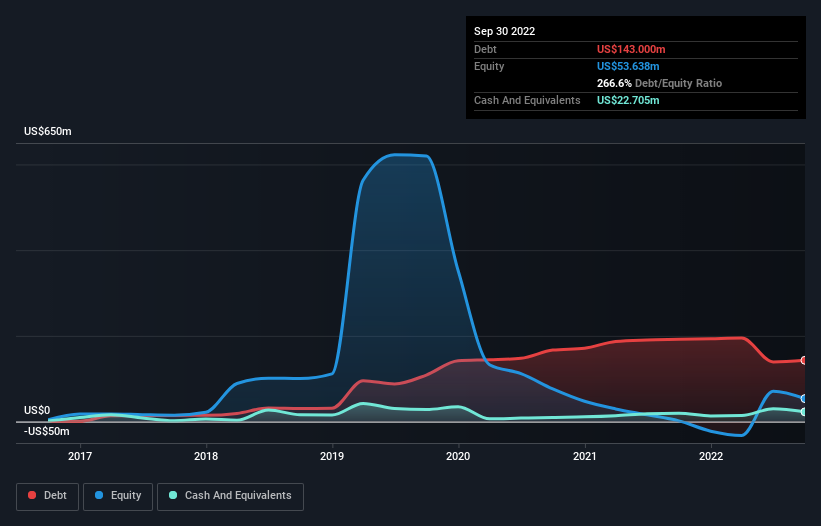Some say volatility, rather than debt, is the best way to think about risk as an investor, but Warren Buffett famously said that 'Volatility is far from synonymous with risk.' So it seems the smart money knows that debt - which is usually involved in bankruptcies - is a very important factor, when you assess how risky a company is. Importantly, iAnthus Capital Holdings, Inc. (CSE:IAN) does carry debt. But the more important question is: how much risk is that debt creating?
When Is Debt A Problem?
Debt assists a business until the business has trouble paying it off, either with new capital or with free cash flow. Part and parcel of capitalism is the process of 'creative destruction' where failed businesses are mercilessly liquidated by their bankers. However, a more usual (but still expensive) situation is where a company must dilute shareholders at a cheap share price simply to get debt under control. Having said that, the most common situation is where a company manages its debt reasonably well - and to its own advantage. The first thing to do when considering how much debt a business uses is to look at its cash and debt together.
View our latest analysis for iAnthus Capital Holdings
How Much Debt Does iAnthus Capital Holdings Carry?
As you can see below, iAnthus Capital Holdings had US$143.0m of debt at September 2022, down from US$191.9m a year prior. However, because it has a cash reserve of US$22.7m, its net debt is less, at about US$120.3m.

How Strong Is iAnthus Capital Holdings' Balance Sheet?
According to the last reported balance sheet, iAnthus Capital Holdings had liabilities of US$104.3m due within 12 months, and liabilities of US$190.1m due beyond 12 months. Offsetting these obligations, it had cash of US$22.7m as well as receivables valued at US$3.46m due within 12 months. So it has liabilities totalling US$268.2m more than its cash and near-term receivables, combined.
This deficit casts a shadow over the US$141.7m company, like a colossus towering over mere mortals. So we definitely think shareholders need to watch this one closely. After all, iAnthus Capital Holdings would likely require a major re-capitalisation if it had to pay its creditors today. There's no doubt that we learn most about debt from the balance sheet. But it is iAnthus Capital Holdings's earnings that will influence how the balance sheet holds up in the future. So if you're keen to discover more about its earnings, it might be worth checking out this graph of its long term earnings trend.
In the last year iAnthus Capital Holdings had a loss before interest and tax, and actually shrunk its revenue by 14%, to US$173m. We would much prefer see growth.
Caveat Emptor
Not only did iAnthus Capital Holdings's revenue slip over the last twelve months, but it also produced negative earnings before interest and tax (EBIT). Its EBIT loss was a whopping US$61m. When we look at that alongside the significant liabilities, we're not particularly confident about the company. We'd want to see some strong near-term improvements before getting too interested in the stock. Not least because it burned through US$27m in negative free cash flow over the last year. So suffice it to say we consider the stock to be risky. The balance sheet is clearly the area to focus on when you are analysing debt. However, not all investment risk resides within the balance sheet - far from it. To that end, you should be aware of the 4 warning signs we've spotted with iAnthus Capital Holdings .
If you're interested in investing in businesses that can grow profits without the burden of debt, then check out this free list of growing businesses that have net cash on the balance sheet.
Valuation is complex, but we're here to simplify it.
Discover if iAnthus Capital Holdings might be undervalued or overvalued with our detailed analysis, featuring fair value estimates, potential risks, dividends, insider trades, and its financial condition.
Access Free AnalysisHave feedback on this article? Concerned about the content? Get in touch with us directly. Alternatively, email editorial-team (at) simplywallst.com.
This article by Simply Wall St is general in nature. We provide commentary based on historical data and analyst forecasts only using an unbiased methodology and our articles are not intended to be financial advice. It does not constitute a recommendation to buy or sell any stock, and does not take account of your objectives, or your financial situation. We aim to bring you long-term focused analysis driven by fundamental data. Note that our analysis may not factor in the latest price-sensitive company announcements or qualitative material. Simply Wall St has no position in any stocks mentioned.
About CNSX:IAN
iAnthus Capital Holdings
Owns and operates licensed cannabis cultivation, processing, and dispensary facilities in the United States.
Moderate risk and slightly overvalued.
Similar Companies
Market Insights
Community Narratives



